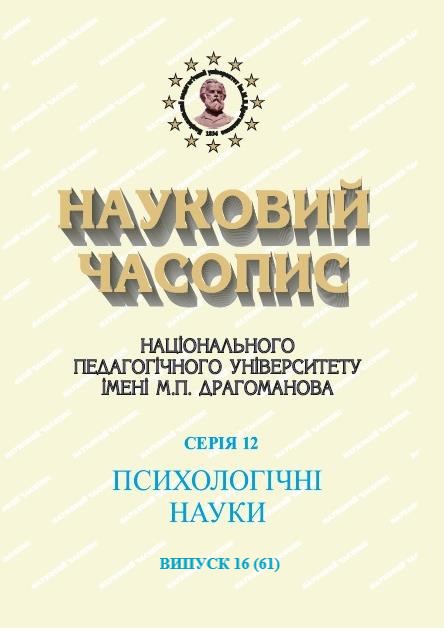PSYCHOLOGICAL PECULARITIES OF PROFESSIONAL BURNOUT
DOI:
https://doi.org/10.31392/NPU-nc.series12.2021.16(61).10Keywords:
professional burnout, emotional burnout, stress, professional activity, systematization of models.Abstract
The article emphasizes the urgency of the problem of professional burnout growth, because the emotional well-being of the specialist is one of the determining factors of professional life. Socio-political and socio-economic changes promote new working conditions that certainly affect the psychological and somatic state of the individual. Emotional burnout syndrome is a form of occupational disease that not only destroys a person’s professional activity, but also causes psychosomatic illnesses. The greatest danger of burnout is that it develops almost imperceptibly and if you ignore its first signs, the satisfaction with professional activities will decrease with each passing day, the usual work tasks that are usually performed will easily become difficult, the results will be devalued, colleagues will cause irritation, somatic condition will worsen with each passing day, which leads to disability. The article focuses on the study of the nosological affiliation of the syndrome, because despite the fact that the phenomenon has been studied for more than thirty years, there are many theories and controversies about its origin and affiliation. The main theoretical models of the syndrome in modern and foreign literature are considered and analyzed. The main causes and symptoms are described, the main factors contributing to its formation are identified. Burnout does not depend linearly on such professional factors as seniority, age and external performance. Burnout syndrome can be formed not only in socially oriented professions, but also in representatives of other professional groups in cases where the first priority is a high degree of responsibility for the work performed, unequal emotional stress at work, mainly in the “man - man” system and other factors. At the same time, professional burnout is an individual process caused by a combination of subjective and objective factors that depend not only on personal qualities but also on the individual system of professional development and social factors.
References
- Boyko, V.V (1999). Sindrom “emotsionalnogo vyigoraniya” v professionalnom obschenii [Syndrome of “emotional burnout” in professional communication]. Saint Petersburg :
Piter [in Russian]. - Vodopyanova, N.E (2009). Psihodiagnostika stressa [Psychodiagnostics of stress]. Saint Petersburg : Piter [in Russian].
- Greenberg, J. (2004). Upravlenie stressom [Stress management]. Saint Petersburg : Piter [in Russian].
- Zhuravleva, E.A., & Sergienko, A.L (2011). Stress, vyigoranie, sovladanie v sovremennom kontekste [Stress, burnout, coping in a modern context]. Moscow : Publishing House of the Institute of Psychology of the Russian Academy of Sciences [in Russian].
- Lukyanova, V.V, Vodopyanova, N.E, Orel, V.E, Podsadnoy, S.A, Yurieva, L.N, &
Igumnova, S.A (2008). Sovremennyie problemyi issledovaniya sindroma vyigoraniya u spetsialistov kommunikativnyih professiy [Modern problems of burnout syndrome research in specialists of communicative professions]. Kursk : Publishing house “Kursk State University” [in Russian]. - Mozgova, G.P., Khanetska, T.I., & Yakymchuk, O.І. (2021). Psihosomatika: psihіchne, tіlesne, socіal’ne. Hrestomatіya: Navchalnyy posibnyk [Psychosomatics: psycho, solid, social. Reader: Textbook]. Kyiv : NPU іmenіP. Dragomanova [in Ukrainian].
- Orel, V.E. (1999). Issledovanie fenomena “psihicheskogo vyigoraniya” v otechestvennoy i zarubezhnoy psihologii [Research of the phenomenon of “mental burnout” in domestic and foreign psychology]. Problemy obschey i organizatsionnoy psihologii – Problems of general and organizational psychology, 76–97 [in Russian].
- Selye, G. (2002). Stress bez distressa [Stress without distress]. Moscow : Progress [in Russian].
- Samoukina, N.V. (2003). Psihologiya professionalnoy deyatelnosti [Psychology of professional activity]. Saint-Petersburg : Piter [in Russian].
- Burisch, M., Schaufeli, B., Maslach, C., & Marek, T. (1993). In search of theory: Some ruminations on the nature and etiology of burnout. Professional burnout: Recent developments in theory and research (pp. 75–93). New York : Taylor & Francis.
- Enzmann, M., Berief, P., Engelkamp, C. et al. (1992). Burnout and coping will burnout. Development and evaluation of a burnout workshop. Berlin : Technische Univercitat Berlin, Institut fur Psychologie.
- Freundberger, J. (1974). Staff burnout. Social Scienes, 30(1), 159–165. https://doi.org/10.1111/j.1540-4560.1974.tb00706.x
- Hakanen, J., Bakker, A., Jokisaari, B., & Markku, A (2011). 35-year follow-up study on burnout among Finnish employees. Journal of Occupational Health Psychology, 16(3), 345–360.
- Maslach, C., & Jachson, S.E. (1981). The measurement of experienced burnout. Journal of Occupational Behaviour, 2, 99–113.
- Pains, A., & Maslach, C. (2003). Praktikum po sotsial’noi psikhologii [Experiencing social psychology]. Saint Petersburg : Piter, 528 p. (In Russ.).
- Storlie, F. (1979). Burnout: the elaboration of a concept. AJN Am J Nursing, 2108–2111.
- Shirom, A. (1989). Burnout in Work Organizations. In C.L. Cooper, & I. Robertson (Eds.), International Review of Industrial and Organizational Psychology (pp. 25–48). New York : Wiley.

